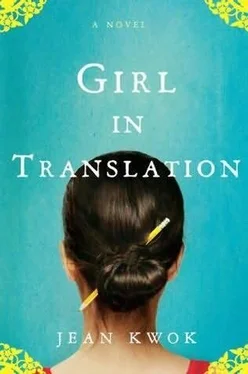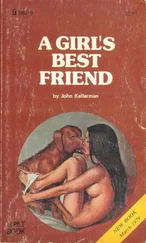After lunch, Mr. Bogart gave out sheets of paper with a drawing of a map.
“This is a pop quick,” he said. “Fill in allde captal see T’s.”
The other kids groaned but many of them started writing. I looked at my piece of paper and then, in desperation, glanced at the white girl’s sheet to try to see what we were supposed to do. Suddenly, the sheet of paper slid out from under my fingers. Mr. Bogart was standing next to me with my test in his hands.
“No cheap pen!” he said. His nose and cheeks were flushed as if he were getting a rash. “You a hero!”
“I sorry, sir-” I began. I knew he wasn’t calling me a hero, like Superman. What had he said? Although I’d had basic English classes in school in Hong Kong, my old teacher’s accent did not in any way resemble what I now heard in Brooklyn.
“ ‘I’mmm,’ ” he said, pressing his lips together. “ ‘ I’m sorry.’ ”
“I’m sorry,” I said. My English mistakes clearly annoyed him, although I wasn’t sure why.
Mr. Bogart wrote a large “0” on my paper and gave it back to me. I felt as if the zero were fluorescent, blinking in neon to the rest of the class. What would Ma say? I’d never gotten a zero before, and now everyone thought I was a cheat too. My only hope was to impress Mr. Bogart with my industry when we cleaned the classrooms after school. If I’d lost any claim to intelligence here, I could at least show him I was a hard worker.
But when the last bell finally rang, all of the other kids ran out of the room. No one stayed behind to mop and sweep the floors, put up the chairs or clean the blackboards.
Mr. Bogart saw me hesitating and asked, “Can I help you?”
I didn’t answer and hurried from the classroom.
Ma was waiting for me outside. I was so happy to see her that when I took her hand, my eyes became hot.
“What is it?” she said, turning my face to her. “Did the other children tease you?”
“No.” I wiped my cheeks with the back of my hand. “It’s nothing.”
Ma looked at me intently. “Did some child hit you?”
“No, Ma,” I said. I didn’t want to worry her when there was so little she could do. “Everything is different here, that’s all.”
“I know,” she said, still looking concerned. “What did you do today?”
“I don’t remember.”
Ma sighed, then gave up and started teaching me how to get to the factory by myself. She went through a long list of things for me to be careful of: strange men, homeless people, pickpockets, touching the dirty railing, standing too close to the edge of the platform, etc.
Once we passed the entrance of the subway, the roar of an incoming train blocked out her words. Behind the grimy windows, we could see the walls of the tunnels speed by in a blur. There was so much noise that Ma and I could speak little on the subway ride there. There were two boys about my age sitting across from us. As the taller one got up, a bulky knife fell out of his pocket. It was sheathed in leather, the black handle grooved to fit a large hand. I pretended I wasn’t looking and willed myself to be invisible. The other boy gestured, the first one picked it up, and then they left the train. I peeked at Ma and she had her eyes closed. I huddled closer to her and concentrated on learning the stops and transfers so I wouldn’t get lost by myself.
When we got out of the train station, Ma turned to me and said, “I wish you didn’t have to take the subway by yourself.”
That was the first time. Going to the factory after school would become something so automatic that sometimes, even when I needed to go someplace else years later, I would find myself on the trains to the factory by accident, as if that were the place to which all roads led.

Chinatown looked very much like Hong Kong, although the streets were less cramped. The fish store was piled high with sea bass and baskets of crabs; grocery store shelves were stocked with canned papayas, lichee nuts and star fruit; peddlers on the street sold fried tofu and rice gruel. I felt like skipping beside Ma as we passed restaurants with soy sauce chickens hanging in the window and jewelry stores that glittered with yellow gold. I could understand everyone without any effort: “No, I want your best winter melons,” one woman said; “That’s much too expensive,” said a man in a puffy jacket.
Ma brought us to a doorway that led to a freight elevator. We took the elevator upstairs and exited. When Ma pushed open the metal door of the factory, the heat rushed out and wrapped itself around me like a fist. The air was thick and tasted of metal. I was deafened by the roar of a hundred Singer sewing machines. Dark heads were bent over each one. No one looked up; they only fed reams of cloth through the machines, racing from piece to piece without pausing to cut off the connecting thread. Almost all the seamstresses had their hair up, although some strands had escaped and were plastered to the sides of their necks and cheeks by the sweat. They wore air filters over their mouths. There was a film of dirty red dust on the filters, the color of meat exposed to air for too long.
The factory took up the entire floor of a massive industrial building on Canal Street. It was a cavernous hall bulging with exposed beams and rusting bolts covered in ever-thickening layers of filth. There were mountains of fabric on the floor next to the workers, enormous carts piled high with half-finished pieces, long metal racks hung with the pressed and finished clothes. Ten-year-old boys rushed across the floor dragging carts and racks from section to section. The fluorescent light swirled down to us through the clouds of fabric dust, bathing the tops of the women’s heads in a halo of white light.
“There’s Aunt Paula,” Ma said. “She was out collecting rent earlier.”
Aunt Paula strode across the factory floor with a load of red fabric in her arms, distributing work to the seamstresses. The ones to whom she gave the bigger loads seemed grateful, nodding repeatedly to show their thanks.
Now she had seen us and she came over.
“There you are,” she said. “The factory is impressive, isn’t it?”
“Older sister, can I talk to you?”
I could see this wasn’t the response she wanted. Her face seemed to tighten, and then she said, “Let’s go to the office.”
Although no one dared to stare openly, the workers’ eyes followed us as we walked with Aunt Paula to Uncle Bob’s office at the front of the factory. We passed women using machines I had never seen before to hem pants and sew on buttons. Everyone worked at a frantic pace.
Through the window of the office door, we could see Uncle Bob sitting behind a desk. His walking stick leaned against the wall next to him. We entered and Aunt Paula closed the door behind us.
“First day, eh?” Uncle Bob said.
Before we had a chance to reply, Aunt Paula spoke. “I’m sorry, but we don’t have much time,” she said. “I can’t let the other workers think I’m showing you any favoritism, just because you’re family.”
Ma said, “Of course not. I know you’re both very busy and you haven’t seen the apartment we’re in, but it is not very clean.” Ma meant that it was below acceptable living standards. “And I don’t believe it is a safe place for ah-Kim.”
“Oh, little sister, don’t worry,” Aunt Paula said, with such warmth and reassurance in her voice that I believed her despite myself. “It is only temporary. There was no place else available that you would be able to afford, not with the many expenses you have. But Mr. N. has many buildings, and as soon as another place opens up that you can pay for, we will move you there.”
Читать дальше













